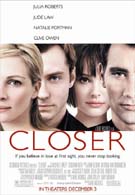Directed by Mike Nichols, Closer is the story of two couples and a terminal case of cheating. The abandoned other halfs drift off into their own various pits of despair, one returns to becoming a stripper, the other simply stops shaving and starts thinking poorly of women. People scream back and forth at each other, and everything is spoken in extremely simple, sometimes realistic, sometimes odd sounding sentences that make dialogue zip out at a blistering pace. Told in a series of relationship flashes over the course of several years, the film’s intent is primarily to cover a host of key moments in each couple’s love life, then move on to the next. Covered are all types of drama involving passion, love, abandonment, and old fashion emotional abuse.
However, Closer is getting a lot of buzz, not necessarily because of its content, but because of what it doesn’t contain: Natalie Portman’s breasts. Originally filmed with extensive nude scenes (since she does play a stripper), Director Mike Nichols cut the shots in the film’s final hours before release, partly for artistic reasons and partly because Portman had become uncomfortable having them seen. I can’t say I blame her, however perhaps then she shouldn’t have been playing a stripper. It’s a painful truth, but our society is much more interested in the exposure or non-exposure of a 24 year old starlet’s bosoms than we are in a complicated story of betrayal, love, redemption, and brutal pettiness. Closer contains all those things, but does not contain celebrity nudity and so suffers for it.
It suffers not because I needed something to get me revved but because Portman plays a stripper and is simply incapable of being convincing as such while leaving her top on. Some actresses ooze sex no matter what they’re wearing. Angelina Jolie for instance would look like a sexual goddess even were she to stride on screen wearing a full gorilla suit. Natalie Portman on the other hand can’t shake her god given innocence, and so though she’s striding around in a thong bikini, she’s never convincing as a woman who drops her top. Actually showing her doing so might have been a shock to the audience, and finally gotten across what Portman herself is trying so desperately to convey: That she’s not just some innocent child. Instead, in her big scene with Clive Owen at the club, she comes off as a stripper automaton, a robot programmed to perform certain moves, but whose normal duties involve things like curling up in a corner with an “Anne of Green Gables” book.
Jude Law fares little better, though in his case I doubt the removal of clothes would have helped. His character is simply a slime and it’s hard to feel anything resembling sympathy for him, when it’s easier to wish for his death. At least Jude gets a reaction, Julia Roberts is simply puzzling in a fairly bland performance portraying a character whose motivations rarely make any sense.
The only real winner here is Clive Owen, who finally shows some of the potential I’ve been hearing he has for so long. He’s a rough, sexually motivated character who seems to be the only person in the film capable of cutting to the heart of the bullshit swirling around him. When he’s betrayed by the woman he thinks love him, he falls into a spiraling pit of despair, ending up in the aforementioned strip club with Portman. He pulls off grungy and beaten right along with imposing and powerful. This is his best work to date, and he finds real zest in the short, choppy dialogue screenwriter Patrick Marber has given him to play with.
Nichols, who recently won a lot of acclaim for the mini-series “Angels in America”, does a capable job with a mostly pointless script. It seems to be conflict for conflict’s sake, with characters engaging in ridiculous affairs brought on by unrealistic romantic actions. The film struggles for relationship realism, but comes up confused. Still, the look is sharp and comfortable, the music a nice eclectic mix of eighties pop ballads and musical score. Closer isn’t exactly a bad movie, it just feels like an empty one.
Your Daily Blend of Entertainment News

